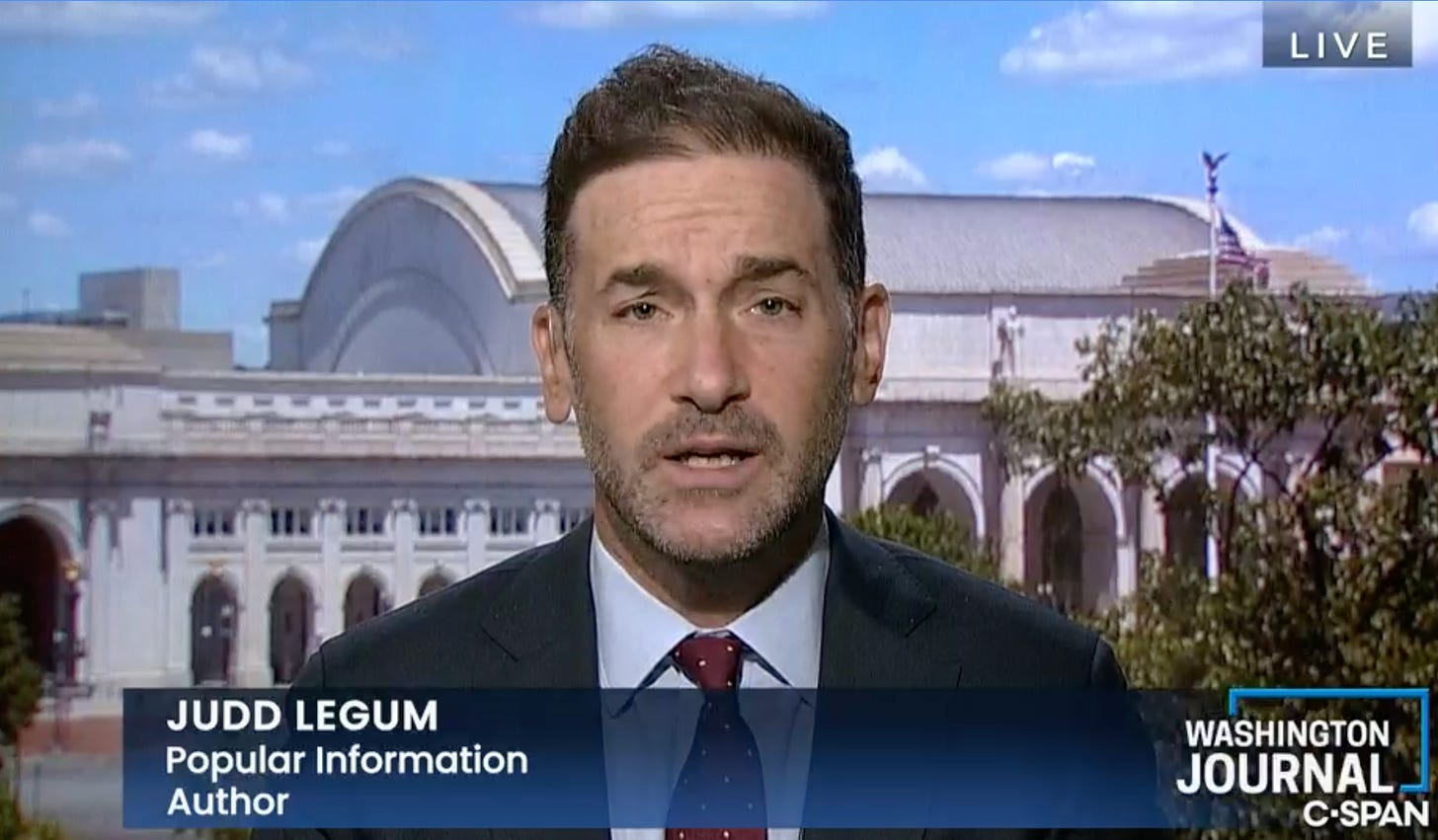The Big Q&A With Independent Journalist Judd Legum
Journalist, lawyer and political staffer Judd Legum answers questions from George and Team Takei.
The media landscape is shifting and old funding models are failing. With local newspapers closing, digital media is stepping in to fill the void.
And luckily for us, that means the emergence of some groundbreaking journalism, like Judd Legum’s Popular Information newsletter.
Having founded progressive media and news site Think Progress in 2005, then serving as Research Director for Hillary Clinton’s 2008 presidential campaign and even running for local office himself, Judd Legum went off on his own in 2018 launching Popular Information to do deep investigative journalism from a progressive perspective.
Unbeholden to advertisers or corporate donors, Judd’s work is truly independent and an essential journalistic tool, even as progressive news is increasingly being suppressed by social media sites.
Popular Information is entirely reader-supported and regularly digs into the sources of corporate and political power, exposing hypocrisy and demanding accountability as only an independent outlet can.
On today’s Big Q&A, I speak with Judd about the importance of independent journalistic voices, the most impactful stories he’s covered, and how he feels his work fits into the ever-changing news and media ecosystem.
— George Takei and Team
I’m going to give you a chance to toot your own horn a bit.
Tell us about a story you and your team at Popular.info recently broke that you feel was a real game changer.
Two recent stories come to mind.
First, a lot of people started paying attention to Tennessee House Speaker Cameron Sexton (R) earlier this year when he expelled two Democratic members of the legislature because they participated in a protest against gun violence at the state capitol.
We broke the story that Sexton secretly purchased a $600,000 home in Nashville. Our reporting forced Sexton to admit his family lives in Nashville and raised serious questions about whether Sexton can legally represent his district, which is two hours away.
The news generated a flurry of national and local media coverage, including a lengthy piece in the Tennessean, the state's largest paper. Based on our reporting, residents of Sexton's district filed a civil complaint with the Tennessee Attorney General and a non-profit watchdog group called for state and federal criminal investigations into Sexton's conduct.
Another really important story involves the death of an indigenous woman in Montana. We revealed that the investigation into the death of Mika Westwolf, a 22-year-old allegedly run over by a White nationalist, was under-resourced, haphazard, and focused on pinning blame on the victim.
The driver of the vehicle that killed Westwolf, who has not been charged, named her two children "Aryan" and "Nation." The story was picked up by major national news organizations, including Democracy Now, Huffington Post, The Daily Mail, and New York Magazine.
After our initial report, the Montana Highway Patrol told us that the FBI had begun assisting with the investigation. We are still waiting on the results.
The news media landscape has been shifting rapidly over the past ten years.
What is the most troubling trend you’ve seen, and where are things headed?
The most troubling trend is so many journalists losing their jobs. So much of the media is supported by corporate advertisers, and corporate advertisers don't care about news.
Ideally, corporations would like to advertise alongside something non-controversial, like sports or entertainment content. It makes it hard for outlets that focus on political and investigative journalism to stay afloat.
There are a lot of gaps in news media to fill, whether it’s the news deserts created by shuttering local papers, billionaire tech moguls pulling the algorithmic rug out from under creators or the death of the web 2.0 ad model.
Where do independent journalists like you fit into today’s media landscape?
I don't think independent journalists like myself are a silver bullet for the media industry's larger problems—but we can help. We can take on local stories that are getting overlooked and expose them to a national audience.
I published a story last week, for example, on a school board in Pennsylvania that hired, at a cost of $125 per hour, a completely unqualified educational consultant with close ties to the right-wing group Moms for Liberty.
The reason I think newsletters are an important tool is that they are mostly insulated from big tech algorithms. My readers want to hear from me, and I send them content directly.
I don't have to worry so much about clicks and engagement. I can instead focus on delivering something valuable to my readers.
Does the fact that you are supported by subscribers instead of paid by a big outlet change the way you do things as an investigative journalist?
Yes. Most big outlets receive a significant portion of their funding from corporate advertisers. I don't think reporters at these outlets wake up and think about how to protect corporations.
But, on the other hand, I don't think CNN did a lot of investigative work on AT&T from 2018 to 2022 while it was owned by AT&T. Popular Information, however, doesn't have a corporate overlord. And we've done a lot of investigative journalism about AT&T.
What is your forecast for the state of digital publishing and online news sites over the next 5 to 10 years?
I'm not a great prognosticator, but my hope is a larger group of independent journalists who are able to support themselves, an explosion of local news outlets and a robust group of national outlets covering important issues. This will require more people who can afford it to pay for news and for news outlets to recapture more advertising dollars.
I'm optimistic that this could happen because I think people really care about their communities and their world. There are quite a few people willing to spend time and money educating themselves about what is happening.
And there is no reason that companies that don't produce any news content, like Google and Meta, should be the only ones making money from news.
What advice do you have for writers who want to make a living through publishing online media?
The key is to focus your work on your passions. When I first started my newsletter, I had a bunch of ideas about what was supposed to be in a political newsletter and tried to do all those things.
But I eventually abandoned that and just started nerding out about the things that interest me—even if it wasn't the day's big story. And that's when I started seeing success.
To support Judd Legum's work, you can subscribe to Popular Information here.









I think Substack itself is the model for how independent journalism can flourish. The main problem is the pricing structure.--the need to pay for each individual substacker. I have already gone way over budget on supporting substackers I like (including The Big Picture and Popular Information); as new interesting ones come to my attention I will read but can't afford to subscribe. Perhaps an ASCAP model would work better? Say a "ticket" for X dollars that would let you subscribe to Y substackers (with the funds shared) --and various tiers giving you more Y for more X. The substacker would get less per person but quite likely a lot more people--who would then do a whole lot of recommending to friends.
Judd’s Substack is always a great read. Totally trustworthy.